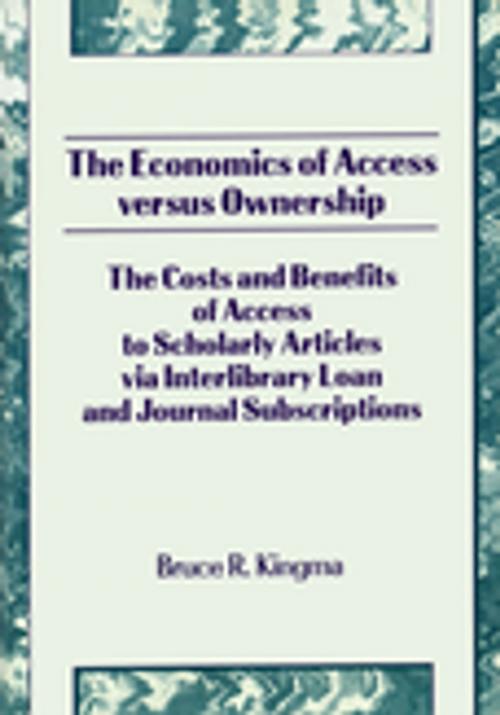The Economics of Access Versus Ownership
The Costs and Benefits of Access to Scholarly Articles via Interlibrary Loan and Journal Subscriptio
Nonfiction, Reference & Language, Language Arts, Library & Information Services| Author: | Bruce Kingma | ISBN: | 9781134755745 |
| Publisher: | Taylor and Francis | Publication: | August 21, 2013 |
| Imprint: | Routledge | Language: | English |
| Author: | Bruce Kingma |
| ISBN: | 9781134755745 |
| Publisher: | Taylor and Francis |
| Publication: | August 21, 2013 |
| Imprint: | Routledge |
| Language: | English |
The Economics of Access Versus Ownership offers library professionals a model economic analysis of providing access to journal articles through interlibrary loan as compared to library subscriptions to the journals. This model enables library directors to do an economic analysis of interlibrary loan and collection development in their own libraries and to then make cost-efficient decisions about the use of these services.
This practical book’s analysis and conclusions are based on 1994/95 academic year research conducted by the State University of New York libraries at Albany, Binghamton, Buffalo, and Stony Brook. The research determined the costs and benefits of high-priced, low-use scholarly journals, focusing on journals in the mathematics and sciences that historically have high prices, low levels of use, and increasing rates of price escalation. The libraries’financial costs of access by interlibrary loan versus journal subscriptions was calculated and, using this information, a set of decision rules was established. Library directors and interlibrary loan/collection development heads can use this set of decision rules to determine, based on the level of use and subscription price, whether they should provide access to journal articles via interlibrary loan or journal subscriptions.
The research findings presented in The Economics of Access Versus Ownership are significant to library professionals as journal subscription prices escalate and commercial document delivery services, consortium agreements, and interlibrary loan hardware and software proliferate. Contributors explore important factors necessary to understanding the economics of access. They encourage readers to consider the following when choosing between journal subscriptions and interlibrary loan:
-
financial costs
-
fixed and marginal costs
-
decision rules which determine the most economically efficient method of access
-
the use of a library consortium and joint collection development within the consortium as an economically efficient method of access
-
added benefits of a library consortium
Information found in The Economics of Access Versus Ownership makes it a useful guide for university and college library directors, interlibrary loan department heads, and collection development heads trying to choose the most economically sound, both for their libraries and their patrons, form of access to journal articles.
The Economics of Access Versus Ownership offers library professionals a model economic analysis of providing access to journal articles through interlibrary loan as compared to library subscriptions to the journals. This model enables library directors to do an economic analysis of interlibrary loan and collection development in their own libraries and to then make cost-efficient decisions about the use of these services.
This practical book’s analysis and conclusions are based on 1994/95 academic year research conducted by the State University of New York libraries at Albany, Binghamton, Buffalo, and Stony Brook. The research determined the costs and benefits of high-priced, low-use scholarly journals, focusing on journals in the mathematics and sciences that historically have high prices, low levels of use, and increasing rates of price escalation. The libraries’financial costs of access by interlibrary loan versus journal subscriptions was calculated and, using this information, a set of decision rules was established. Library directors and interlibrary loan/collection development heads can use this set of decision rules to determine, based on the level of use and subscription price, whether they should provide access to journal articles via interlibrary loan or journal subscriptions.
The research findings presented in The Economics of Access Versus Ownership are significant to library professionals as journal subscription prices escalate and commercial document delivery services, consortium agreements, and interlibrary loan hardware and software proliferate. Contributors explore important factors necessary to understanding the economics of access. They encourage readers to consider the following when choosing between journal subscriptions and interlibrary loan:
-
financial costs
-
fixed and marginal costs
-
decision rules which determine the most economically efficient method of access
-
the use of a library consortium and joint collection development within the consortium as an economically efficient method of access
-
added benefits of a library consortium
Information found in The Economics of Access Versus Ownership makes it a useful guide for university and college library directors, interlibrary loan department heads, and collection development heads trying to choose the most economically sound, both for their libraries and their patrons, form of access to journal articles.















